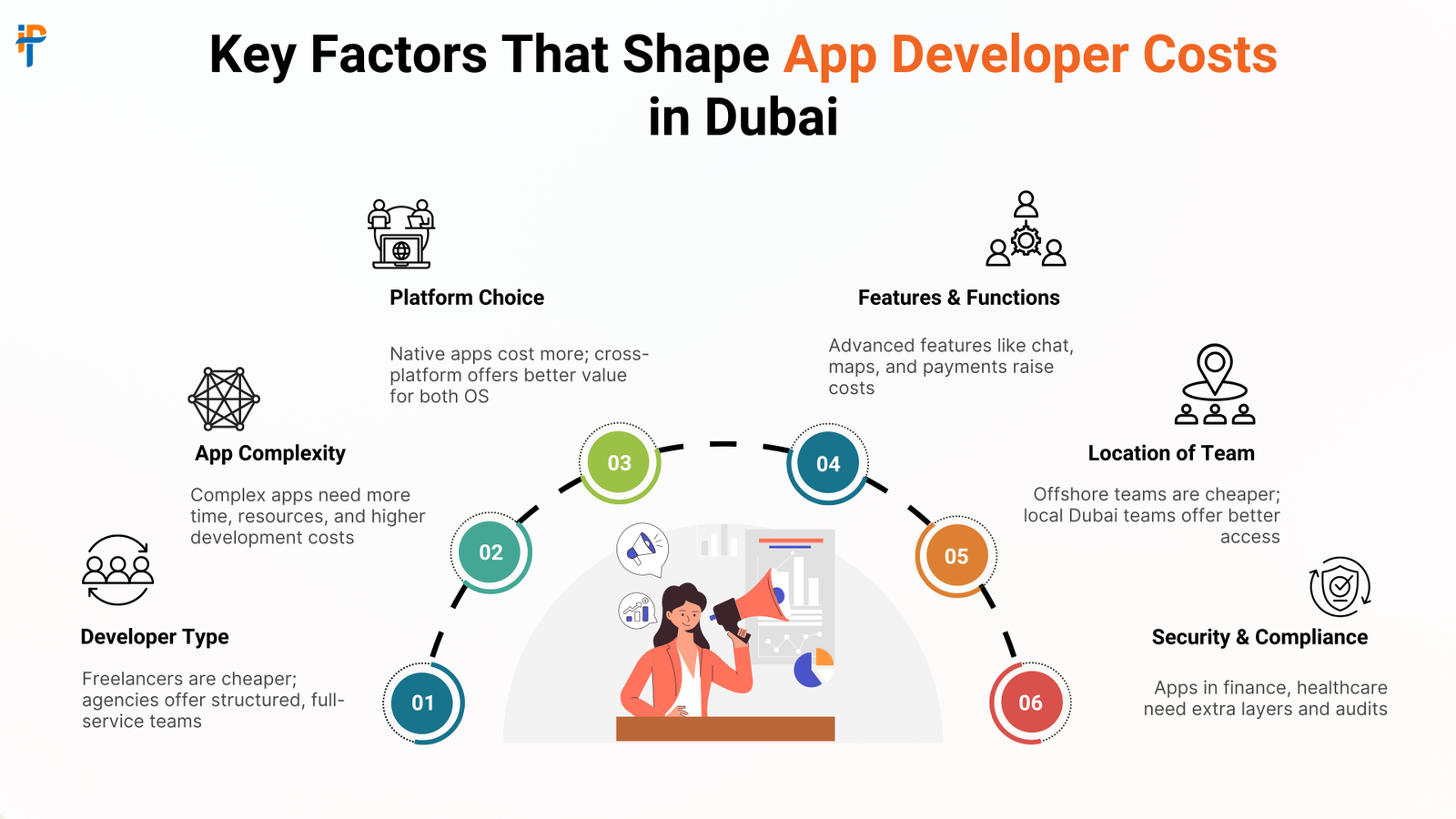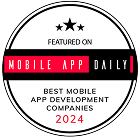How Much Does It Cost to Hire an App Developer in Dubai 2025?
So, you’ve got this killer app idea. Maybe it’s going to revolutionize how people order shawarma, connect fitness enthusiasts across the UAE, or streamline logistics in Jebel Ali. Awesome! But then reality hits:
How much is this going to cost me to build in Dubai? It’s the question on every aspiring app entrepreneur’s mind, and frankly, the answer isn’t a single number plastered on a billboard. Dubai’s tech scene is vibrant, competitive, and diverse, which means costs vary… a lot.
Let’s ditch the vague guesses and dive deep into the real factors that shape the price tag of hiring an app developer in this dynamic city. Get ready for some honest talk, practical ranges, and tips to make sure you invest wisely.
Why Dubai? The App Gold Rush Isn’t Slowing Down
Dubai isn’t just about skyscrapers and luxury cars; it’s a serious tech hub. Government initiatives like the Dubai Digital Strategy and the sheer volume of businesses and consumers make it a fertile ground for apps. Whether you’re targeting locals, tourists, or the massive expat community, the potential user base is huge.
This demand fuels a thriving developer ecosystem, but it also means you need to be savvy about navigating the options and their costs. Competition for top talent is real!
The Million-Dollar (or Dirham) Question: It Depends!
Here’s the unvarnished truth upfront: There is no one-size-fits-all price for app development in Dubai. Asking “How much for an app?” is like asking “How much for a car?” Are you picturing a sleek Ferrari or a reliable Toyota Corolla?
Both get you from A to B, but the experience and price are worlds apart. Your app’s cost is uniquely tied to your specific vision, requirements, and choices.
Breaking Down the App Development Cost Puzzle
To understand your potential cost, we need to dissect the key ingredients that go into the final bill. Think of it like baking a complex cake – the quality and quantity of each component matter.

Factor #1: Who Are You Hiring? (The Talent Spectrum)
This is arguably the biggest cost driver. Dubai offers a vast range of talent, each with its pricing structure:
Freelancers: The Agile (But Risky?) Option
Pros: Often, the most budget-friendly hourly rates. Great for very specific, well-defined tasks or small MVP builds. Flexibility.
Cons: Finding reliable, highly skilled freelancers takes effort. Managing multiple freelancers (designer, developer, QA) can become a project manager’s nightmare. Risk of inconsistency, communication gaps, or disappearing acts. Limited accountability and long-term support can be issues. Rates vary wildly based on skill and origin.
Dubai Reality Check: Rates can range from AED 80 to AED 300+ per hour, heavily dependent on expertise and experience.
Boutique Agencies: Specialized & Personal
Pros: Typically small, nimble teams (5-20 people) with deep expertise in specific areas (e.g., fintech apps, healthcare apps). Offer personalized service, direct access to senior talent, and often a strong design focus.
Cons: May have limited capacity for very large projects. Pricing sits above freelancers but below large agencies.
Dubai Reality Check: Expect hourly rates to be roughly between AED 200 to AED 450. Project quotes vary significantly based on scope.
Mid-Sized Development Firms: The Balanced Approach
Pros: Offers a good blend of structure, resources, and expertise. Can handle medium to fairly complex projects. Have established processes for development, QA, and project management. Broader skill sets than boutiques.
Cons: Can be less personalized than boutiques. Costs are higher than freelancers/boutiques.
Dubai Reality Check: Hourly rates often fall in the AED 250 to AED 500+ range.
Large Tech Agencies: The Full-Service Powerhouses
Pros: One-stop shop for everything: strategy, complex development, cutting-edge tech (AI, Blockchain), enterprise-grade solutions, extensive QA, dedicated project managers, robust post-launch support. Ideal for large-scale, mission-critical apps.
Cons: Highest price point. Processes can sometimes feel bureaucratic. May assign junior resources to parts of your project despite the premium cost.
Dubai Reality Check: Premium pricing reflects their overhead and expertise. Hourly rates typically start around AED 400 and can easily exceed AED 700. Large projects often run into hundreds of thousands, if not millions, of dirhams.
Factor #2: What Kind of App Are You Building? (Complexity is King)
The nature of your app fundamentally shapes the effort (and cost) required:
Simple Apps (Basic Functionality, MVP Stage)
Think: Basic informational apps, simple calculators, very limited single-feature utilities, very basic MVPs (Minimum Viable Product).
Characteristics: Primarily static content, minimal user interaction, no complex backend, no integrations, basic UI/UX.
Cost Implication: Lowest end of the spectrum.
Medium Complexity Apps (Common Features, Integration)
Think: BMost e-commerce apps, social networking apps (basic), food delivery apps, booking systems, productivity tools with standard features.
Characteristics: User accounts/profiles, database integration, API integrations (e.g., payment gateways like Telr or PayTabs, maps, SMS), standard push notifications, moderate custom UI/UX design, content management system (CMS) backend.
Cost Implication: The “middle ground” where most business apps land. Significant variation based on specific features.
Highly Complex Apps (Custom Features, Advanced Tech)
Think: On-demand service apps (like Careem/Uber clones), sophisticated social/media platforms, enterprise resource planning (ERP) mobile solutions, apps with real-time multi-user features (e.g., gaming, collaboration), heavy use of AI/ML, IoT integration, complex backend architecture, advanced security needs (common in fintech).
Characteristics: Highly customized functionality, real-time data syncing, complex algorithms, integration with multiple legacy systems, bespoke animations/interactions, extensive backend development, rigorous security protocols, potential need for third-party hardware integration.
Cost Implication: Top end of the scale. Requires senior talent and significant time investment.
Factor #3: Platform Choice: Native, Hybrid, or Cross-Platform?
Native Apps (iOS Swift/Kotlin for Android): Built specifically for one platform (iOS or Android). Deliver the best performance, user experience, and access to device hardware.
Cost Implication: The Highest development cost as you essentially build two separate apps. Maintenance is also doubled.
Hybrid Apps: Essentially web apps wrapped in a native shell. Single codebase deployable to both platforms.
Cost Implication: Lower initial development cost than two native apps. Performance and user experience can sometimes feel less polished than native, especially for graphics-heavy or complex interactions.
Cross-Platform Apps: Write code once using frameworks that compile to near-native performance. Single codebase for iOS and Android.
Cost Implication: Significantly cheaper than two native apps, often approaching hybrid costs but with much better performance and user experience. Very popular choice for budget-conscious projects needing good quality on both platforms. Requires developers skilled in these specific frameworks.
Factor #4: Design:
First impressions are everything. A polished, intuitive, and engaging user interface (UI) and user experience (UX) design is non-negotiable for app success.
Cost Implication: Complex custom animations, intricate micro-interactions, unique iconography, and extensive user testing significantly increase design costs compared to using basic templates or stock elements. Expect design to consume a substantial portion of your budget (15-25%+).
Factor #5: Features & Functionality:
Every button, screen, integration, and piece of logic costs time and money to develop and test. Be ruthless in prioritizing your MVP features.
Common cost drivers include:
- User Authentication (Login/Signup – simple vs. social login vs. biometrics)
- Payment Gateway Integration (Essential for e-commerce – complexity varies)
- Geolocation & Maps
- Push Notifications
- Chat/Messaging
- In-App Purchases/Subscriptions
- Offline Functionality
- Camera/Photo/Video Integration
- Complex Data Visualization
Third-Party API Integrations (Each one adds cost and complexity)
Factor #6: Backend Development:
Your app needs a brain! The backend server handles data storage, user management, business logic, API integrations, and more.
Cost Implication: A simple app might use a basic backend-as-a-service (BaaS) like Firebase. Complex apps require custom backend development (using Node.js, Python/Django, Ruby on Rails, Java Spring, etc.), which is a major cost factor. Scalability and security are crucial considerations impacting backend costs.
Factor #7: Maintenance & Updates:
Your app isn’t a “set it and forget it” product. Budget for:
Bug Fixes: Things will break or behave unexpectedly.
OS Updates: iOS and Android release new versions yearly; your app needs updates to stay compatible.
Feature Updates: Adding new functionality based on user feedback or market changes.
Server Costs: Ongoing hosting fees for your backend and databases.
Cost Implication: Typically 15-20% of the initial development cost per year is a reasonable ballpark for ongoing maintenance and minor updates.
Freelancer Rates in Dubai:
Junior Developers: AED 80 – AED 150 per hour
Mid-Level Developers: AED 150 – AED 250 per hour
Senior/Expert Developers: AED 250 – AED 350+ per hour
Note: Quality and reliability vary immensely. Factor in potential project management overhead.
Agency Rates in Dubai:
Boutique Agencies: AED 200 – AED 450 per hour
Mid-Sized Firms: AED 250 – AED 550+ per hour
Large Agencies: AED 400 – AED 750+ per hour
Project-Based Pricing: The All-Inclusive Quote?
Many agencies prefer fixed-price quotes for well-defined projects. This gives you cost certainty but requires a VERY detailed specification upfront. Changes usually incur extra charges (change orders). Fixed-price projects are typically calculated by estimating the total hours required and multiplying by the agency’s blended hourly rate, plus a contingency.
Real-World Cost Ranges:
Finally, the ballpark figures you’ve been waiting for! Remember, these are estimates for the development phase only (design, development, basic testing). Excludes ongoing maintenance, advanced marketing, or complex server infrastructure setup. Complexity trumps platform count (e.g., a simple cross-platform app costs less than a complex native app for one platform).
How to Get the Best Value (Without Sacrificing Quality)
Nail Your MVP Scope: Define the absolute core functionality needed to launch and test your idea. Avoid “nice-to-haves” initially.
Invest in Planning & Specs: A detailed functional specification document (FRD) is worth its weight in gold. It reduces ambiguity and costly changes later. Wireframes and prototypes help immensely.
Get Multiple Quotes: Approach 3-5 potential partners (mix of freelancers and agencies). Compare not just price, but understanding, approach, and communication.
Prioritize Communication & Process: Choose a partner with clear communication channels and a defined development process (Agile is common and effective). Regular updates are crucial.
Consider Cross-Platform: For many business apps, React Native or Flutter offers an excellent value and quality balance.
Ask About Maintenance Plans: Factor this ongoing cost into your budget from the start.
Check Portfolios & References Rigorously: Look for apps similar in complexity to yours. Talk to past clients.
Choosing Your Dubai App Development Partner: Key Considerations Beyond cost, evaluate:
Technical Expertise: Do they have proven experience with your required tech stack and app type?
Portfolio & Case Studies: Relevant past work? Ask about challenges and solutions.
Communication & Transparency: Are they responsive? Do they explain things clearly? Do you feel like a partner or just a client?
Development Process: Do they use Agile? How do they handle changes and testing?
Cultural Fit & Understanding: Do they “get” your vision and target market (especially important in Dubai’s diverse landscape)?
Location & Time Zone: While remote work is common, some prefer local partners for easier face-to-face meetings (when needed).
Post-Launch Support: What does their maintenance package include? Response times?
About IPH Technologies: Your Vision, Our Expertise
At IPH Technologies, we turn visionary ideas into impactful digital solutions. As a leading app development company in Dubai, we offer:
- Mobile Apps (iOS & Android, Native & Cross-Platform)
- Scalable Web Applications
- Custom Software Solutions
Why Partner with Us?
- Proven Track Record: 500+ projects, 430+ clients, 284+ Clutch reviews.
- Expertise Across Domains: From apps to custom software—we’ve got it covered.
- Latest Tech & Agile Methods:Flexible, transparent, and on-time delivery.
- Client-First Approach:We’re invested in your success and focused on results.
- Future-Focused Solutions:Designed to meet goals and gain an edge in Dubai’s digital space.
At IPH Technologies, we don’t just build apps—we build lasting partnerships. Ready to bring your vision to life? Let’s talk.
The Investment Mindset: Your App is a Business Asset
Stop thinking “cost” and start thinking “investment.” A well-built app is a powerful business tool – it can drive sales, improve customer loyalty, streamline operations, or open entirely new revenue streams. While budget is crucial, prioritize value and quality.
Cutting corners on development often leads to a poor user experience, technical debt, and higher costs down the line when you need to rebuild or fix fundamental issues. Investing wisely upfront in the right partner and a solid product sets you up for long-term success in Dubai’s competitive market.
Conclusion: Navigating the Dubai App Development Landscape
So, “how much does it cost to hire an app developer in Dubai?” It’s a complex equation—driven by who you hire, what you’re building, the tech stack, and the level of polish. Costs can range from tens of thousands to well over a million dirhams.
The takeaway? Knowledge is power. Understand cost factors, be realistic, plan well, and choose your App development partner wisely. Get quotes, ask tough questions, and ensure shared vision. Dubai has world-class talent—find the right fit, invest smartly, and your app can thrive in this booming digital hub. Good luck!













.png)


